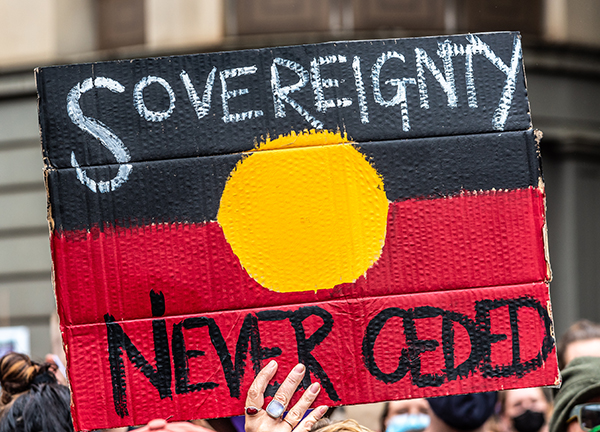by Amy Davidson, Matthew Compton and Lindsay McCabe.
SUPRA recognises the diversity of Aboriginal and Torres Strait Islander Peoples. There are many differing views regarding the Voice to Parliament across Aboriginal and Torres Strait Islander communities.
SUPRA also recognises the importance of self-determination for Aboriginal and Torres Strait Islander Peoples. All societies, clubs, faculties and schools have a responsibility to ensure that Aboriginal and Torres Strait Islander Peoples are given meaningful opportunities to take part in the conversations that affect them – ‘No conversations about us without us’.
A Voice to Parliament Referendum is practically centred around the amendment of the Constitution. Constitutional law is confusing even for experts. Here we attempt to unpack the racist sections of the Constitution and hopefully demystify it, with the aim that people can make more informed decisions at the upcoming referendum.
First things first: the Australian Constitution mentions ‘race’ in s. 25 and s. 51(xxvi). Different human races do not exist. Period. The idea of race was developed to suit the British and European colonial project and the pursuit of resources. Racism exists now as a social phenomenon, experienced by First Nations Peoples and peoples of colour globally. Australia’s Constitution came into force on the 1st of January 1901, at the height of the White Australia policy. The dominant ideology of the time was centred around the false idea of ‘race and racism.’
Constitutional amendments – removal of S 25 and S 51(xxvi)
There has long been judicial recognition that s. 25 and s. 51(xxvi) of the Constitution are representative of highly racialised and anachronistic powers.
Section 25 is entitled ‘Provision as to races disqualified from voting’, and provides that:
If by the law of any State all persons of any race are disqualified from voting at elections for the more numerous House of the Parliament of the State, then, in reckoning the number of the people of the State or of the Commonwealth, persons of that race resident in that State shall not be counted.
The provision impugns states which exclude all persons of a particular ‘race’ from voting at the state level, as that state will then receive less funding due to the resultant lower population count. However, as Arcioni (2012) argues, the symbolic potentiality of a state excluding a group from voting on the grounds of ‘race’ or ethnicity, is antithetical to contemporary Australian standards of equality and non-discrimination. The ability for a state to lawfully exclude Aboriginal and Torres Strait Islander Peoples (or any ethnic minority) from being included in the ‘number of people’ is racially discriminatory and in violation of basic human rights.
Removing Section 25 has been described as the least controversial proposal (Arcioni 2012) presented by the 2012 Expert Panel on Constitutional Recognition of Indigenous Australians. Recommendations for it to be repealed have been made consistently since as early as 1959, with the Report from the Joint Committee on Constitutional Review noting that the appropriate action would be to repeal the section.
Section 51(xxvi) falls under the constitutional powers of the Parliament, which states that:
The Parliament shall, subject to this Constitution, have power to make laws for the peace, order, and good government of the Commonwealth with respect to … (inter alia) the people of any race, for whom it is deemed necessary to make laws.
Prior to the 1967 Referendum, this section did not apply to ‘the Aboriginal race’. Although the judicial argument has been put forward that the operation of this section should only apply to legislating for the benefit of Indigenous Australians (or other racial groups), this was rejected by the High Court in Kartinyeri v Commonwealth (1998), with a stricter constitutional interpretation preferred. Section 51(xxvi) allows the government to create legislation and policy for Aboriginal and Torres Strait Islander Peoples specifically. No other group or population in Australia is subject to this kind of targeted policy and legislation making. On this basis alone, Aboriginal and Torres Strait Islander Peoples have a democratic right to be represented in the policy and legislation making process.
The Voice to Parliament proposes that a preamble is inserted into the Constitution to allow a body or ‘Voice’ be made up of Aboriginal and Torres Strait Islander Peoples to provide timely feedback. The feedback is then tabled in Parliament on any legislation and policy that directly impacts Aboriginal and Torres Strait Islander Peoples. The feedback given does not have to be enforced but simply must be read in parliament. Whatever your views on the powers and details of the Uluru Statement and the Voice to Parliament, we at SUPRA encourage students to make informed decisions and to respect the diverse views of Aboriginal and Torres Strait Islander Peoples and communities. Let’s have these conversations safely.
SUPRA is proud to support all Aboriginal and Torres Strait Islander students and staff, no matter how they vote in the upcoming referendum.



Stay in touch with us